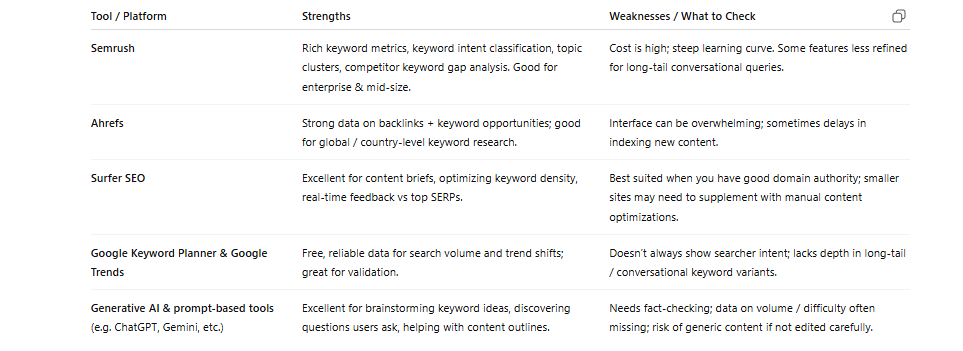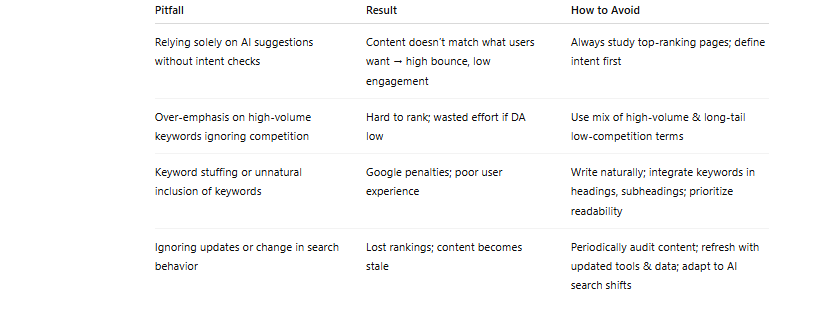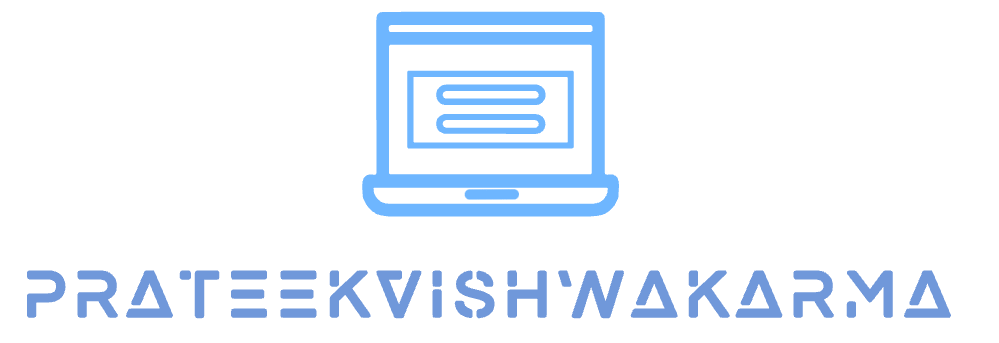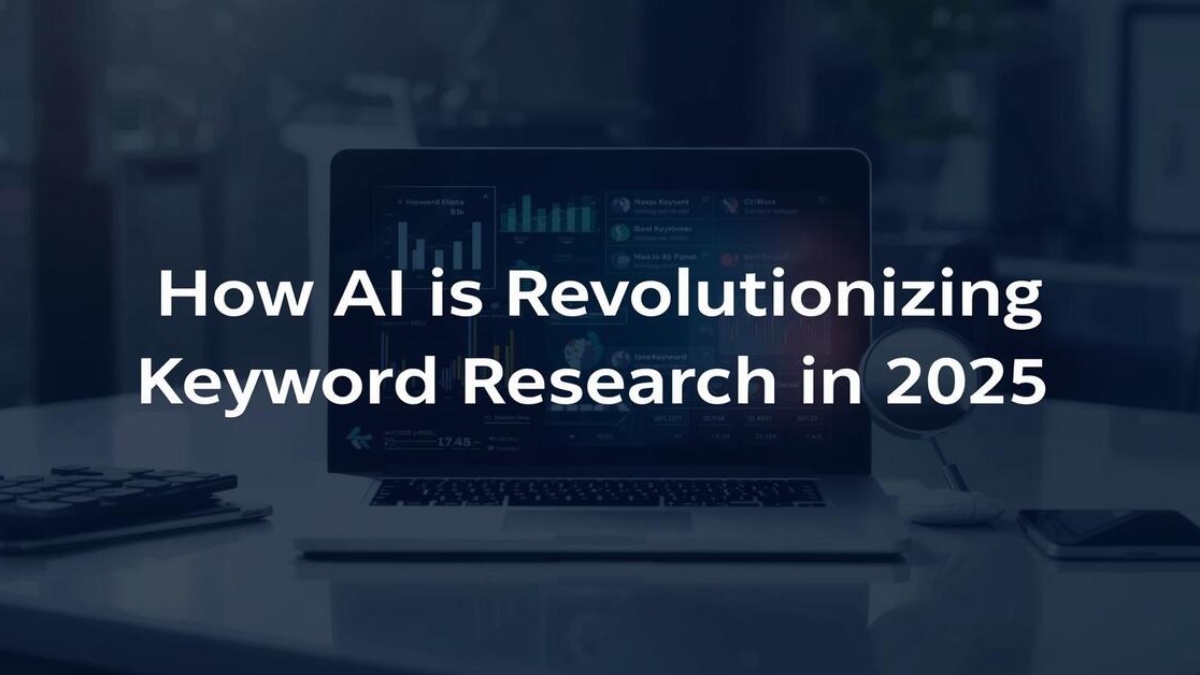Table of Contents
How AI Is Revolutionizing Keyword Research in 2025: Tools, Trends & Best Practices
Introduction
The landscape of SEO is changing fast. In 2025, AI keyword research tools and generative intelligence are no longer just buzzwords — they’re core drivers of how content is discovered, optimized, and ranked. If you’re targeting audiences in the US, UK, Canada, and Australia, understanding these shifts means the difference between being buried in search results and riding the wave of trending traffic.
In this article, we’ll explore the latest AI in SEO trends, compare tools, dig into best practices, and show how to future-proof your keyword research strategy. Let’s dive in.
What’s Driving the Shift: Why AI Keyword Research Matters More Than Ever
Changes in Search Behavior
- Users now ask more conversational, full-sentence queries. Think “What is the best AI tool to generate blog ideas” rather than “AI tool blog ideas.” AI models (LLMs) and search engines are getting better at understanding intent rather than just matching keywords.
- Voice search is growing, both on mobile and smart speakers. This means long-tail keywords and natural language are more important.
- AI Overviews, Search Generative Experience (SGE), chat-based answers are showing up more in search results. When people get direct answers without clicking through, content must be more useful, authoritative, and well structured.
Market & Tool Trends
- The AI productivity tools market is forecast to grow massively, driven by demand for automation, remote-work efficiency, workflow optimization. KeywordSearch
- Tools that integrate real-time SERP data, intent classification, prompt / query mining are leading: e.g. Surfer, Ahrefs, SEMrush are extending features. Marketer Milk+2Marketer Milk+2
- There’s increasing importance of semantic search and intent matching: not just finding keywords people use, but understanding why they use them.
Top AI Tools & Platforms for Keyword Research in 2025
Here are tools that are performing well in Tier-1 countries, along with key capabilities to look for:

Best Practices: How to Do AI-Powered Keyword Research That Actually Works
Intent First → Keywords Second
- Always identify user intent: informational, navigational, transactional, or commercial investigation. What is the searcher trying to achieve?
- Examine what currently ranks for your target terms: Are the top results blogs, product pages, FAQs, videos? Match that.
- Use “question-based” long-tail keywords to capture people asking the “how,” “why,” “which” etc.
Use Clusters & Semantic Mapping
- Group related keywords into clusters. Don’t try to optimize dozens of low-value keywords separately if they map to similar topics.
- Build content hubs: a central pillar piece + supporting articles. Helps with internal linking, authority, topic depth.
- Semantic keywords matter: include synonyms, related concepts, latent semantic indexing (LSI) phrases.
Blend AI Tools With Human Oversight
- Use AI to generate ideas & outlines, but always verify: check whether competing content is already using those topics, whether content adds unique value.
- Use manual research to assess keyword difficulty, traffic potential, domain authority needed.
- Monitor metrics after publishing: click-through rates, engagement, bounce rate, dwell time. Adjust accordingly.
Optimize for Emerging Search Modes
- Voice search: optimize content to answer questions directly, in natural language.
- Featured snippets / answer boxes / AI Overviews: format content with clear headings, lists, tables. Use question headings, FAQs.
- Multimodal content: include visuals, diagrams, videos when relevant — these can help with Discover & social sharing.
Common Pitfalls & How to Avoid Them

Case Study (Hypothetical) — Applying This Strategy for a US / UK Audience
Let’s assume you run a tech blog in the US/UK targeting “AI tools for productivity.” Here’s how you might apply a strong keyword research + content strategy:
- Seed Keywords: “best AI tools for productivity”, “AI productivity tools 2025”, “AI productivity software for teams”
- Intent Check: Search these terms; note if people want listicles, reviews, comparisons, or tutorials. Suppose we see list articles and review posts dominating.
- Cluster Topics:
- Pillar: “Top AI Productivity Tools for Teams in 2025”
- Supporting: “How to choose AI productivity software”, “Free vs paid AI tools for productivity”, “Case study: boosting team productivity with AI tools”, “Integrations between AI tools and workplace workflows”
- Use Tools: Use Surfer / Semrush / Ahrefs to verify keyword volume & difficulty in US & UK. Use prompt-based AI to generate possible FAQs (“What’s the best AI tool for remote teams?” etc.).
- Content Format: Use FAQs, tables (tool comparisons), screenshots, visuals. Optimize meta title & description for CTR. Ensure the article answers both high-volume keywords and long-tail, intent-rich queries.
Trends Forecast: What’s Coming in Keyword Research & AI
- Answer Engine Optimization (AEO) will get more important: optimizing content to be used as direct answers by AI / chat systems.
- Conversational / Voice Search Growth: more searches done via voice or natural language → content must be more natural, question-based.
- Increasing Role of Prompt Data / AI Search Volume: tools or platforms that show which prompts people are actually using in AI platforms. Writesonic
- AI Search Traffic Rising: AI-powered search tools are sending more engaged visitors to the web.
Conclusion
AI-powered keyword research is no longer optional: it’s central to ranking, user engagement, and content success in Tier-1 markets (US, UK, Canada, Australia). By combining modern tools with a focus on user intent, conversational search, and strong content structure, you can stay ahead. Start cluster planning, audit your current content for voice/search intent alignment, and keep a pulse on tools & trends—so you don’t just
FAQs on AI in Keyword Research (2025)
Q1. How is AI different from traditional keyword research tools?
AI tools don’t just provide keyword volumes — they analyze search intent, user behavior, and future trends. This helps marketers target keywords before they peak, unlike traditional tools that rely on historical data only.
Q2. What are the best AI keyword research tools in 2025?
Some of the most effective AI-powered tools in 2025 include Semrush AI Assistant, Ahrefs with AI Insights, Google’s Gemini for SEO, SurferSEO, and ChatGPT-powered research plugins. These platforms use machine learning to deliver smarter keyword clusters and competitor insights.
Q3. Can AI predict future keyword trends?
Yes. AI uses predictive analytics by tracking search behavior, seasonality, and real-time data sources (like Google Trends, social media, and news). This helps marketers prepare content around emerging keywords before competitors catch up.
Q4. Does AI keyword research help with Google Discover and voice search?
Absolutely. AI is excellent at identifying long-tail conversational queries and semantic search patterns, making it easier to optimize for voice assistants, mobile search, and Google Discover recommendations.
Q5. Is AI replacing human SEO experts?
Not entirely. AI automates data analysis, clustering, and predictions, but human creativity and strategy are still essential for writing engaging content, building backlinks, and shaping overall SEO campaigns.

